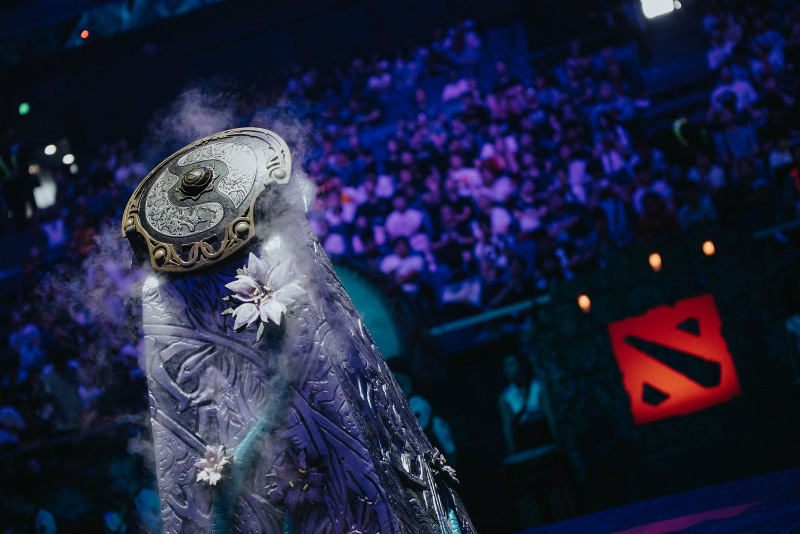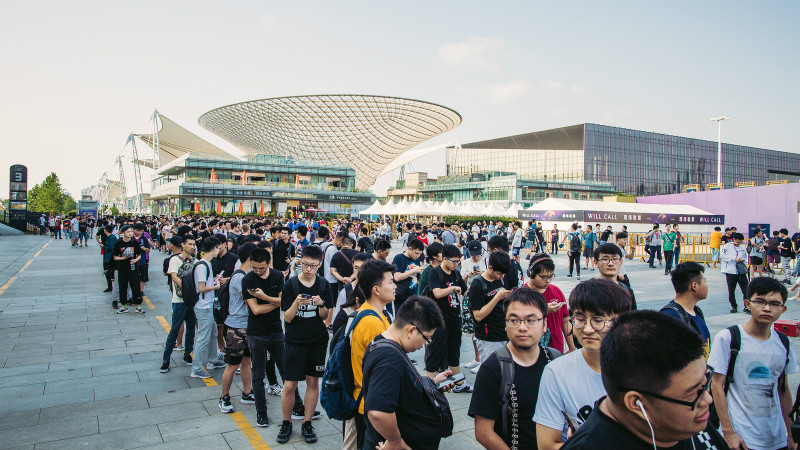

The International 2019 Dota 2 (TI9) championships wrapped up on Sunday in Shanghai's Mercedes-Benz Arena after a week of applause and roller-coaster exhilaration.
With a record-breaking prize pool of over 34 million dollars, 18 teams from around the world were pit against each other from Aug. 15 to 25 for the Aegis of Champions, the ultimate honor for every Dota player.
European team OG made history by winning the tournament for the second consecutive year, taking home a prize of more than 15 million dollars. The most promising Chinese team in this year's TI, PSG.LGD, placed third in the tournament with a prize of around 3 million dollars.

European team OG made history by claiming the Aegis of Champions for the second consecutive year. (Photo/Perfect World)
"Thanks for the continuous support. And to those who are pursuing gaming as a career: just try your best and do not give up," said Yap Jian Wei, who is also known as xNova in the team PSG.LGD.
"Throughout the history of eSports, TI has held unique standing and influence with its fans as well as in global eSports competitions, said Dai Yanmiao, associate professor of Shanghai University of Sport. "At least for this summer, Shanghai has caught the eye of the whole eSports world."
In June 2019, Shanghai introduced a plan to dramatically boost the local cultural industry, intending to become a global eSports hub within three to five years.
The Shanghai Municipal Government has launched a set of measures dedicated to promoting the local eSports industry. The city will upgrade and build more eSports venues to meet international standards, providing subsidies for several eSports organizations, streaming platforms and events, among others.

The Aegis of Champions, the ultimate honor for every Dota player. (Photo/Perfect World)
Dai explains that Shanghai's biggest advantage is its high level of internationalization with advanced infrastructures, making it a favored location for the emerging industry.
Xiao Hong, CEO of Perfect World Co., Ltd. concurred. "Shanghai has not only the stadium facilities but also infrastructures in terms of education and talent. The market will boom even more," Xiao said.
The eSports market revenue in Shanghai surpassed the 2 billion dollar mark in 2018, accounting for 19 percent of the national total.
"ESports has taken root and flourished in this city," Dai said. "More importantly, the concepts in sports such as cooperation, unity, and win-win results play a rather crucial role in building Shanghai into a global e-sports hub. We'll see all of these spirits here in the future," he added.

China has risen to the top in the global eSports industry, becoming a global mecca in 2015 with an audience of 82 million. According to a report released by Penguin Intelligence, that number is expected to reach 350 million this year.
In the first half of this year alone, the Chinese gaming industry made more than 16 billion dollars – an increase of 8.6 percent compared with the same period last year.
"I think the strong support offered by national policies is a crucial step for the industry and gamers like us," said Chinese team ViCi Gaming's Coach Bai Fan - aka rOtK, whose team finished in sixth place in this year's TI. "Our parents and grandparents have had many misunderstandings towards eSports. They think that eSports is just a bunch of kids playing computer games. Many of our teammates have received National Athlete Certificates. I think when we have these credentials, our parents will understand that we're not just playing."

The number of China's eSports audience is expected to reach 350 million this year. (Photo/Perfect World)
"This is a career. At first, nobody believed in us. People thought it was just a game," Xiao said. "Over the last five to 10 years, we witnessed eSports growing into something serious, into such a big market. This is no longer a play-for-fun thing. You will continue to witness a lot of growth in terms of economics and involvement."
"Whether it's China's eSports industry or Chinese eSports teams, we have become more noticeable on the world stage," Professor Dai said, adding "eSports is a matter of cultural confidence now, that will help China establish its own image in such a huge domain with the young generation at its core."

 Award-winning photos show poverty reduction achievements in NE China's Jilin province
Award-winning photos show poverty reduction achievements in NE China's Jilin province People dance to greet advent of New Year in Ameiqituo Town, Guizhou
People dance to greet advent of New Year in Ameiqituo Town, Guizhou Fire brigade in Shanghai holds group wedding
Fire brigade in Shanghai holds group wedding Tourists enjoy ice sculptures in Datan Town, north China
Tourists enjoy ice sculptures in Datan Town, north China Sunset scenery of Dayan Pagoda in Xi'an
Sunset scenery of Dayan Pagoda in Xi'an Tourists have fun at scenic spot in Nanlong Town, NW China
Tourists have fun at scenic spot in Nanlong Town, NW China Harbin attracts tourists by making best use of ice in winter
Harbin attracts tourists by making best use of ice in winter In pics: FIS Alpine Ski Women's World Cup Slalom
In pics: FIS Alpine Ski Women's World Cup Slalom Black-necked cranes rest at reservoir in Lhunzhub County, Lhasa
Black-necked cranes rest at reservoir in Lhunzhub County, Lhasa China's FAST telescope will be available to foreign scientists in April
China's FAST telescope will be available to foreign scientists in April